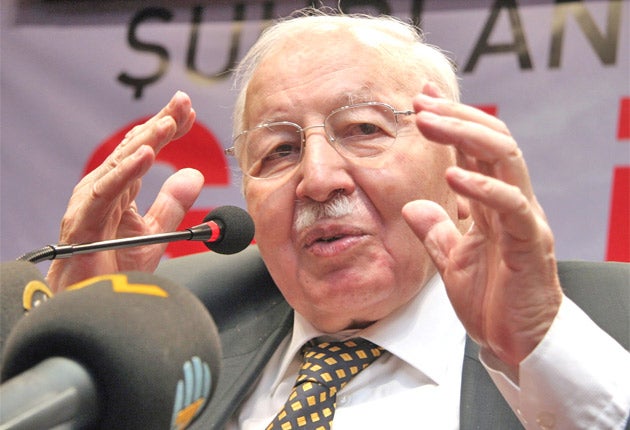Necmettin Erbakan: Politician who served as Turkey's first Islamist prime minister

Necmettin Erbakan, the long-time leader of Turkey's Islamic political movement, was briefly Prime Minister in the country's first Islamic-led coalition. Despite political bans and party closures, he always re-emerged and never wavered from his belief in an Islamic Turkey.
Erbakan's wit and colourful personality endeared him even to his opponents. He was affectionately known as "Hodja", or "Teacher", by his followers and former members of his banned Welfare Party, including the Prime Minister Recep Erdogan, President Abdullah Gül and other protégés. He is credited with laying the foundations for political Islamism in modern Turkey. "Erbakan was a scientist who devoted his life to learning," Erdogan said. "We will remember him with gratitude."
Born in the Black Sea port of Sinop in northern Turkey in 1926, Erbakan was the son of a criminal court judge, Mehmet Sabri, one of the last Islamic judges of the Ottoman Empire, whose system of religious courts was replaced by a secular legal code after the founding of modern Turkey by Kemal Atatürk in 1923. Erbakan was educated at the internationally renowned Istanbul Lisesi.
In 1948, he graduated with a degree in Mechanical Engineering from Istanbul Technical University (UTI), completing his PhD at the Rhenish-Westphalian Technical University of Aachen. He remained in Germany for several years working in the motor industry for Humboldt Deutz, specialising in diesel engine design, as well as serving as chief engineer in the team that designed the German Leopard 1A tanks for the Wehrmacht. His German remained fluent and lyrical.
Upon his return to Turkey, between 1953-65, Erbakan taught engineering at UTI, where he was appointed professor. He concurrently worked in business on the early development of the Turkish motor industry. His political career began when he was elected General Secretary of the Union of Chambers, but he was forced to resign by the government. In the 1969 elections, he was elected to Parliament as an independent for the ultra-religious city of Konya and planted the seeds of the country's political Islamic movement.
In 1970, stunned by the refusal of a centre-right party to nominate him for a seat in Parliament, Erbakan established the National Order Party, which advocated a return to religious values; this defied the secular consensus in the country. The party survived several closures, disappearing in the 1971 military coup then re-emerging in 1973 as the National Salvation Party.
Though the NSP never won enough votes to put him in office, Erbakan emerged as a kingmaker. Twice in the 1970s he briefly served as deputy Prime Minister. The first time brought him to the forefront of national politics when his party won 48 seats and he served in coalition with the Republican People's Party of the Prime Minister Bülent Ecevit during the Cyprus crisis of 1974. The 1980 military coup, though, saw the closure of the NSP and a spell in prison for Erbakan.
In 1983, he emerged as leader of the Welfare Party, which during the 1990s, benefited from the animosity between the leaders of Turkey's two most prominent conservative parties. In 1995, Erbakan led his party to unexpected electoral success, finishing first with 21 per cent of the vote. After striking a coalition deal with another party leader who was eager to control corruption investigations, Erbakan became Prime Minister.
His mistake, however, was to challenge the secular, pro-Western foundations of modern Turkey and try to further relations with Arab states. The party's rural and religious style provoked a strong reaction from the metropolitan middle class, and ultimately the military. In February 1997 the military, who consider themselves the guardians of Turkish secularism, struck, sending tanks into an Islamist town near Ankara and issuing a set of demands. Left with little choice, Erbakan resigned on 28 February.
In 1998 he suffered a further setback when the Welfare Party was banned for violating the principle of secularism in the constitution. The courts judged that the party had an agenda to promote Islamic fundamentalism and Erbakan was again barred from active politics. The ban was upheld by the European Court of Human Rights.
In 2001, some of Erbakan's former lieutenants, who offered a milder brand of Islamic politics and were less anti-Western, had founded the Justice and Development Party (AKP). led by Erdogan, they swept to victory in the 2002 elections with 34 per cent of the vote. This effectively marginalised Erbakan and his new Felicity Party.
Erdogan, Erbakan's former pupil and now Prime Minister, devised a more inclusive political formula that combined respect for religious belief with commitments to democracy, capitalism and Western alliances, including the aim of securing EU membership. This modus operandi has kept him power for nearly a decade.
Erbakan later became the target of corruption charges in a case that became known as "the Missing Trillion", in which cash reserves ordered to be seized after the Welfare Party was closed down had gone missing. In 2002, he was sentenced to two years and four months in prison on charges of "forgery of personal documents." This was later commuted to house arrest.
President Gül, his foreign policy adviser during his ill-fated year in power, pardoned him on health grounds.
Martin Childs
Necmettin Erbakan, academic, engineer and politician; born Sinop, Turkey 29 October 1926; married 1967 (died 2005; two daughters, one son); died Ankara 27 February 2011.
Subscribe to Independent Premium to bookmark this article
Want to bookmark your favourite articles and stories to read or reference later? Start your Independent Premium subscription today.

Join our commenting forum
Join thought-provoking conversations, follow other Independent readers and see their replies
Comments